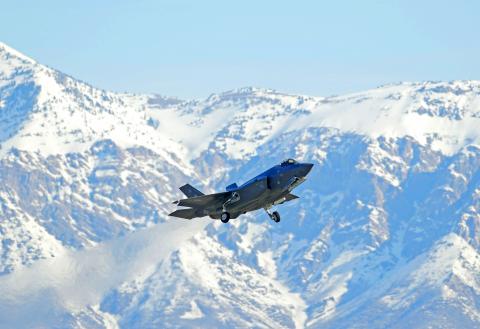The nation does not need a Terminal High Altitude Area Defense (THAAD) system, but welcomes the possibility of acquiring Lockheed Martin F-35 Lightning II multirole jets, the Ministry of National Defense said yesterday in response to speculation that the US might offer Taiwan the two systems.
Japan’s Yomiuri Shimbun on Sunday reported that the US has listed the THAAD system and F-35s in its arms sale items to Taiwan.
The proposed items are considered an attempt by the US to resume talks with Taiwan about a US$1 billion arms deal that has been put on hold.

Photo: AFP
However, the ministry yesterday said that it has not received any information from the US.
“There has been no official word from the US [about the THAAD system and F-35s], and the new US administration has yet to appoint officials on Taiwan affairs, so discussions about the arms deal have not begun,” Department of Strategic Planning Director Wu Pao-kun (吳寶琨) said during a Foreign Affairs and National Defense Committee question-and-answer session.
Deputy Minister of National Defense Cheng De-mei (鄭德美) said the nation does not need a THAAD system in the short term, as the US-made phased-array radar system at Hsinchu County’s Leshan (樂山) base is on par with the THAAD system in terms of detection capability.
However, Chinese Nationalist Party (KMT) Legislator Johnny Chiang (江啟臣) asked if the ministry would cooperate with the US if Taiwan was asked to deploy a THAAD system because of geopolitical concerns, to which Cheng said the ministry would evaluate the necessity should such an request be made.
Cheng’s comments were in slight contrast with Minister of National Defense Feng Shih-kuan’s (馮世寬) last month, as Feng said he firmly opposed the deployment of a THAAD system, because Taiwan should distance itself from the antagonism between China and the US, and that Taiwan should defend itself instead of becoming involved in other nations’ interests.
Meanwhile, fighter jets capable of short or vertical takeoff and landing, such as F-35s, are needed for war scenarios, Wu added.
New Power Party Legislator Freddy Lim (林昶佐) asked if the ministry would voluntarily reduce arms acquisitions to appease Beijing.
Cheng said the military has been developing the defense industry to reduce its reliance on arms imports and the influence of other nations.
Lim urged the ministry to procure whatever is necessary to ensure the nation’s defense capabilities, which could not be compromised due to China’s pressure.
“It is precisely because of the fear of China’s [potential military invasion] that Taiwan should build up its military and the defense capabilities cannot be compromised because of China’s opposition to arms sales,” Lim said.

Taiwan has received more than US$70 million in royalties as of the end of last year from developing the F-16V jet as countries worldwide purchase or upgrade to this popular model, government and military officials said on Saturday. Taiwan funded the development of the F-16V jet and ended up the sole investor as other countries withdrew from the program. Now the F-16V is increasingly popular and countries must pay Taiwan a percentage in royalties when they purchase new F-16V aircraft or upgrade older F-16 models. The next five years are expected to be the peak for these royalties, with Taiwan potentially earning

STAY IN YOUR LANE: As the US and Israel attack Iran, the ministry has warned China not to overstep by including Taiwanese citizens in its evacuation orders The Ministry of Foreign Affairs (MOFA) yesterday rebuked a statement by China’s embassy in Israel that it would evacuate Taiwanese holders of Chinese travel documents from Israel amid the latter’s escalating conflict with Iran. Tensions have risen across the Middle East in the wake of US and Israeli airstrikes on Iran beginning Saturday. China subsequently issued an evacuation notice for its citizens. In a news release, the Chinese embassy in Israel said holders of “Taiwan compatriot permits (台胞證)” issued to Taiwanese nationals by Chinese authorities for travel to China — could register for evacuation to Egypt. In Taipei, the ministry yesterday said Taiwan

Taiwan is awaiting official notification from the US regarding the status of the Agreement on Reciprocal Trade (ART) after the US Supreme Court ruled US President Donald Trump's global tariffs unconstitutional. Speaking to reporters before a legislative hearing today, Premier Cho Jung-tai (卓榮泰) said that Taiwan's negotiation team remains focused on ensuring that the bilateral trade deal remains intact despite the legal challenge to Trump's tariff policy. "The US has pledged to notify its trade partners once the subsequent administrative and legal processes are finalized, and that certainly includes Taiwan," Cho said when asked about opposition parties’ doubts that the ART was

If China chose to invade Taiwan tomorrow, it would only have to sever three undersea fiber-optic cable clusters to cause a data blackout, Jason Hsu (許毓仁), a senior fellow at the Hudson Institute and former Chinese Nationalist Party (KMT) legislator, told a US security panel yesterday. In a Taiwan contingency, cable disruption would be one of the earliest preinvasion actions and the signal that escalation had begun, he said, adding that Taiwan’s current cable repair capabilities are insufficient. The US-China Economic and Security Review Commission (USCC) yesterday held a hearing on US-China Competition Under the Sea, with Hsu speaking on